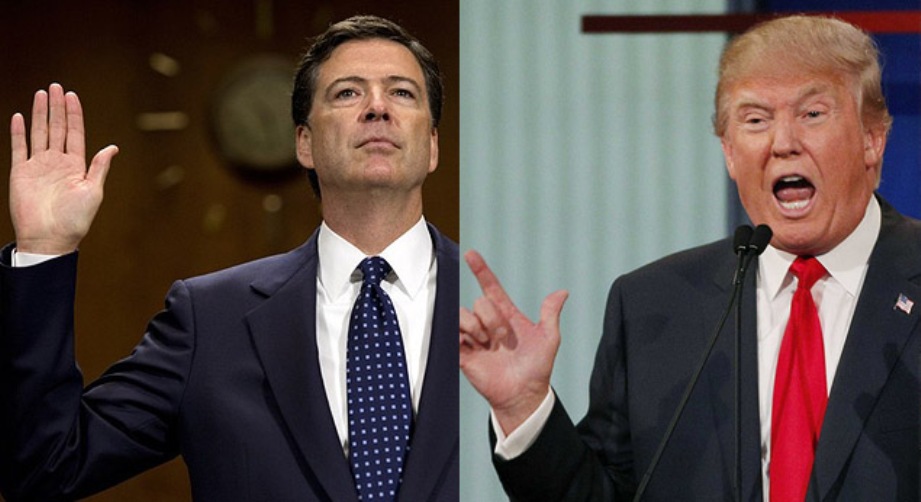Gen. Field Marshall Model’s aide: Field Marshall, pardon me for interrupting, but… British paratroops have apparently landed … three kilometers from here!
Gen. Model: Why should they do that? There is nothing valuable here. … Me! I am valuable. They have all come just to capture me. Get my driver and car. Evacuate my headquarters. …And don’t forget my cigars! – “A Bridge Too Far”

Well… here we are, week eighteen of Field Marshall, oops, I mean President Trump’s administration and, as customary, Mr. Trump likes to begin his week with a heaping helping of controversy and… since this is Wednesday, we’ve got two!
As reported by both The Washington Post (May 15), and The New York Times (May 15), Trump shared highly classified information with Russian Foreign Minister Sergei Lavrov, and Ambassador Sergey Kislyak.
(Psst, Donald, the Russian government is our enemy, and Kislyak has been identified by your own CIA director as a Russian spy.)
However, according to National Security Advisor Gen. H.R. McMaster, the information sharing was “wholly appropriate,” and that the president did not share either sources or methods.
(Whew, for a minute, I thought we were in trouble.)
However #2: according to former CIA Deputy Director Michael Morell, “This is highly damaging for two reasons. First, the Russians will undoubtedly try to figure out the source or the method of this information to make sure that it is not also collecting on their activities in Syria — and in trying to do that they could well disrupt the source.
“The second damage,” Morell told CBS News Anchor Scott Pelley, “is that third countries who provide the United States with intelligence information will now have pause to do so if the United States is sharing such information with the Russians without their permission.”
“Pelley asked Morell if he felt better that, according to National Security Adviser Gen. H.R. McMaster, no methods or sources were compromised.
“ ‘Not a lot better,’ Morell said, ‘but not sharing that source or method does not make any better the problems I outlined earlier.’ ”
Breaking Crisis #2:
According to a story that appeared in yesterday’s New York Times (May 16), President Trump requested F.B.I. Director Comey to halt the bureau’s investigation into former national security adviser, Michael Flynn.
In a memo Comey had written after a February meeting, (not the dinner meeting), with President Trump, the president said, “I hope you can let this go.”
“The existence of Mr. Trump’s request,” The Times writes, “is the clearest evidence that the president has tried to directly influence the Justice Department and F.B.I. investigation into links between Mr. Trump’s associates and Russia.”
In Monday’s commentary I remarked that senior law enforcement officials routinely keep notes and calendars that reflect dates, times and details of key meetings. Comey clearly followed similar protocol.
“Mr. Comey,” The Times adds, “wrote the memo detailing his conversation with the president immediately after the meeting, which took place the day after Mr. Flynn resigned, according to two people who read the memo. The memo was part of a paper trail Mr. Comey created documenting what he perceived as the president’s improper efforts to influence a continuing investigation. An F.B.I. agent’s contemporaneous notes are widely held up in court as credible evidence of conversations.
“Mr. Comey shared the existence of the memo with senior F.B.I. officials and close associates. The New York Times has not viewed a copy of the memo, which is unclassified, but one of Mr. Comey’s associates read parts of the memo to a Times reporter.
“ ‘I hope you can see your way clear to letting this go, to letting Flynn go,’ Mr. Trump told Mr. Comey, according to the memo. ‘He is a good guy. I hope you can let this go.’
“Mr. Trump told Mr. Comey that Mr. Flynn had done nothing wrong, according to the memo.
“Mr. Comey did not say anything to Mr. Trump about curtailing the investigation, only replying: ‘I agree he is a good guy.’ ”
As expected, the White House has denied Comey’s account.
In a statement, the White House said, “While the president has repeatedly expressed his view that General Flynn is a decent man who served and protected our country, the president has never asked Mr. Comey or anyone else to end any investigation, including any investigation involving General Flynn. The president has the utmost respect for our law enforcement agencies, and all investigations. This is not a truthful or accurate portrayal of the conversation between the president and Mr. Comey.”
So, how are we to determine who’s telling the truth?
Fortunately, we do have a way, and it comes from… you guessed it… Mr. Trump’s own tweet.
“James Comey better hope that there are no ‘tapes’ of our conversations before he starts leaking to the press!” – Donald J. Trump, May 12, 2017
Not long after the president’s tweet, Reuters News service reports (May 15) that Republican Senator Lindsey Graham of South Carolina said, “You can’t be cute about tapes. If there are any tapes of this conversation, they need to be turned over.”
“Republican Senator Mike Lee of Utah,” Reuters said, “told the Fox News Sunday program it was ‘inevitable’ that they would be subpoenaed and the White House would have to release them.”
On Tuesday evening, House Oversight Committee Chairman Jason “Chaffetz sent a letter to acting FBI Director Andrew McCabe asking for all memos, summaries and recordings regarding Comey’s communications with Trump,” according to The Hill (May 16).
At one point during Anderson Cooper 360 last night, Cooper asks law professor Alan Dershowitz, “Does the President of the United States need to consult an attorney right now?”
“He does,” Dershowitz said. “He should get a private attorney and the first thing that lawyer will tell him to do is to zip it! He has to stop tweeting and stop talking.”
Only three years, eight months and five days till the end of President Trump’s term, unless…
Comments









